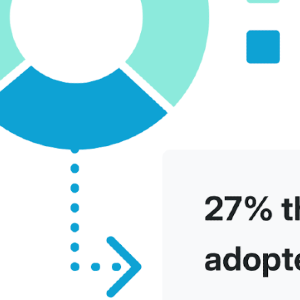Earlier this week WP Engine published The State of Headless Report 2024, a study based on a survey of 1,015 CTOs, CMOs and IT decision makers primarily from Enterprise organizations in the US, UK and Australia.
In their press release, WP Engine state that “those using headless technology feel better equipped for the future,” and that “nearly 70% pointed to competitiveness as the top benefit of using headless.” – two of a many points that underpin their ‘headless is the future’ narrative.
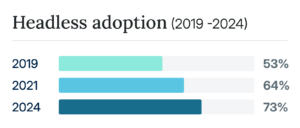
A couple of other interesting findings include:
- 73% of those survey reported adopting headless headless, up 14% and 40% compared to 2021 and 2019 respectively
- 60% believe their organization’s website infrastructure budget will increase in the next 12 months
- Just over 20% of organizations with 250-499 employees cite AI integrations as one of the primary reasons for using headless
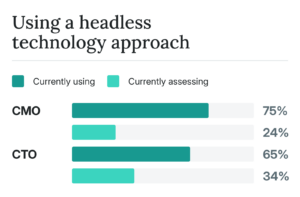
This last point is interesting as it connects the use of AI with the need of a more flexible publication platform, perhaps reflecting the many ways AI can be integrated and deployed as part of content workflows or smart functionality.
Another interesting finding is that CMOs are more heavily involved in developing, designing, marketing, or managing their organization’s website than CTOs, with 81% of the former agreeing that a headless approach allows them to offer a more consistent content experience. However, more CTOs were ‘currently assessing’ the headless approach. The most likely scenario is that they are working together to see how headless can work for their organization.
Get the report: download it from WP Engine’s website: The State of Headless 2024: Defining the Future of Digital Engagement
Not to be confused with DPX
While the market understands what headless is and delivers, and has been a growing trend in the CMS space, it’s not quite its own category as defined by analysts like Gartner. Instead, they talk about and report on ‘Digital Experience Platforms‘, which is a better reflection of what Enterprise is looking for when shopping around for a CMS:
CMO: “We need a DXP to deliver a more engaging and consistent brand experience”
CTO: “Makes sense. A headless CMS is best approach for this.”
CFO: “It works for me if the numbers look good.”
CEO: “What the CFO said.”
A couple of more interesting points about DXP:
A lot of talk in the DXP world now is about ‘composability’. Sitecore CMS explains what this is well:
Unlike a traditional (monolithic) DXP, a composable DXP is inherently modular. It is cloud-native and is comprised of best-of-breed SaaS products that leverage microservices architecture and integrate via APIs. Instead of a singular platform, brands access different functions (e.g., asset management, engagement tools, presentation layer editing, etc.) as purpose-built, plug-and-play packaged business capabilities (PBCs).

Back to the WordPress ecosystem: remember when WP Engine was your WordPress Digital Experience Platform? Now you know why! Messaging has evolved since then, including their recent embracing of the confidence idea.
But this does not mean they are not chasing DXP business. They are leveraging headless as a core capability and the report is a great Sales asset to spark conversations. I wouldn’t be surprised if at some point in time they will position themselves as the WordPress Composable DXP.
Just as important: defining Enterprise
This one is on my to-do list given all the discussions taking place in the community about industry segments and ICPs: to try and help clarify who WordPress is for. I also think the ‘Enterprise’ label is being used (and overused) widely for all kinds of premium products and services, even though there’s often a big gap between what can be delivered and what Enterprise’s requirements actually are. Enterprise WordPress hosting is an example of such label.
For the State of Headless Report, WP Engine surveyed decision makers in organizations achieving an average of approximately USD $800 million in annual revenue. Which is close to Gartner’s figure of $1B but much higher than ChatGPT’s definition of organizations of 250+ staff generating $500M+ in revenue.
It would be great if the WordPress project agreed on a definition for this segment, along with data and analysis covering what their pain points are and how WordPress can help. WordPress Enterprise products and services can then be more accurately positioned as such.
Selling to Enterprise is a completely different ball game too. The sales cycle is longer and more involved. If you are smaller player, consider how hard it can be to sign up an Enterprise client. You may end up spending hours on a RFP only to be dismissed because one of the key selection criteria was the size of your support team.
Is headless an opportunity for all WordPress agencies?
The first question in my mind is whether headless is on the agenda of smaller and mid-sized organizations at all, These are businesses that are much closer fit for 99% of WordPress agencies and freelancers. For example, should a local real estate agent consider a headless approach as part of their next website re-design project? Or does it remain an offering that is exclusive to Scale Consortium-level ICPs?
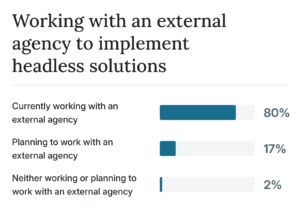
The report doesn’t answer this question specifically, but we can make assumptions given the ongoing… democratization of technology. That is, the process by which technology, initially expensive and accessible only to a select few, becomes cheaper, more widespread, and available to more folks over time.
There is one data point from the report is particularly interesting: 98% of those surveyed are currently working with or planning to work with an agency. A subset of the 17% that are planning to do so may well be looking for a partner agency. Perhaps via WP Engine’s own Agency Partner Directory, which can also be filtered by selecting ‘Headless’ as a specialty.
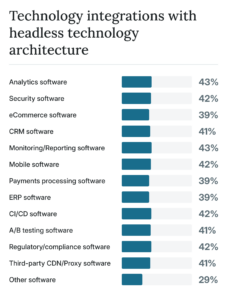
If you feel you are too ‘small’ to engage with Enterprise there is still a way in: you can consult with the larger agencies that Enterprise already have relationships with. This is how I got to work with on a number of large Enterprise projects here in Australia when I was a freelancing as a Marketing Automation consultant. I had the right specialist skills and experience that the agencies that hired me lacked. In the context of headless, and DXP more broadly, there are plenty of opportunities, and many of them not even technical.
Think about it: a composable DXP is made up of may different elements that deliver a broad range of functionality, and complex projects like these need both technical and business specialists. If you look at the report, there’s a list of headless technology integrations that includes analytics, payment processing, CRM, ERP and more. Also, CMOs driving many of these projects means that they’re looking for solutions to deliver personalized and consistent Marketing at scale. How can you help?
If you’re a plugin developer there may be an opportunity to add to the 87 that turn up when you search the repository for ‘headless’. Perhaps look at the challenges and pain points of specific market segments. According to the report, the top three are Sales, Media and Marketing, HR and Legal industries with 82%, 81% and 78% adoption respectively. This is likely to be be the way in for most WordPress pros: via a range of (inexpensive) plugins and products developed for headless that remove much of the cost and complexity. Let me know if you know of any.
WP Engine is all in headless. Perhaps the WordPress project should be too
The report concludes with a bold statement that the future of digital is headless.
This is part of a positioning exercise to make inroads in Enterprise, indeed. But it’s also a big, strategic commitment based on a ton of research, hours of discussions around forecasting and a good dose of risk mitigation.
The findings of this report underscore the critical role headless architecture plays in modern digital strategies. Its rapid adoption highlights the undeniable advantages headless can offer in scalability, flexibility, and the delivery of consistent, high-quality digital experiences, making it an indispensable tool for businesses looking to stay competitive in an increasingly digital-first world.
If you swapped ‘headless’ for ‘Gutenberg’ in this quote could easily be passed for something Matt Mullenweg would say at a keynote. This becomes even more believable if you listen to Jason Bahl, the founder of WPGraphQL, talking about using the WordPress block editor on a headless site. Pantheon wrote about this back in 2019 too, and Matt’s own interest in joining the Block Protocol some time ago reinforces the headless idea in the broader context of block portability.
I’ll conclude with a Google Trends graph for ‘headless cms’ that tells as story we can’t ignore. WP Engine’s report is self serving, as any good marketing is, but the data doesn’t lie. As a minimum, have a think of how positioning yourself closer to headless can work for you.

Similarly, doing a little research for ‘wordpress headless’ in SpyFu returns 270 keywords for 8,45K monthly searches. Interestingly, the top spot is not taken by a WordPress product company by a Gatsby KB article.


